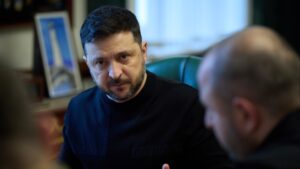Unfamiliar but historic moments from Greece’s nearly decade-long fiscal adventure are revealed for the first time in the pages of a memoir by one of the key players of the period, none other than former German Chancellor Angela Merkel.
The “Iron Lady” of the eurozone quotes unedited incidents from her bilateral talks with the three Greek Prime Ministers of the Memoranda, Giorgos Papandreou of PASOK, Antonis Samaras of ND, and Alexis Tsipras of SYRIZA PS, describing the dramatic moments, the political climaxes, but also the different strategies of the three heads of the Greek government, unraveling the tangle of historical sequences that led to the country’s exit from the memoranda.

In the early days of realizing the extent of Greece’s exposure to the then-German Chancellor, Prime Minister, and President of PASOK, Giorgios Papandreou found himself with a mighty electoral haul in his baggage. However, they didn’t seem to have achieved a common ground of communication, as Merkel recounts that “at that moment I realized that Papandreou had not yet said anything, I asked him directly: “What do you want after all?” The answer was that he wanted anything, and only exclaimed that Greece was facing a very challenging situation.” The Greek problem, however, was swelling at a dizzying pace, and in the first months of 2010, Angela Merkel came back, addressing the then prime minister.

“When will you present to the Commission your plans for saving four percentage points of GDP?” I asked Papandreou. “That is the priority right now, to get the message across to the financial markets that they can trust you again,” Papandreou replied that he needed time. I could not believe my ears. Amid this suffocating pressure to do something about the situation, he behaved as if he had all the time in the world. We were talking intensely and simultaneously, speaking English, French, and German. The interpreters barely had time to whisper our words in our ears.”
Samaras had “failed to fully implement the reforms”
The political situation in Greece is changing, the double elections of 2012 make up a highly volatile political landscape and Antonis Samaras takes the baton as head of an allied government, only reports from the former German Chancellor are extremely sparing.
“His (Alexis Tsipras victory is due to the anger of many Greek citizens over the euro bailout programs… His predecessor Antonis Samaras had failed to fully implement the reforms agreed in the second bailout program,” the chancellor said, although it was a fellow politician who belonged to the conservative European family.
“I was anxious, I confess, to see what kind of personality” Tsipras was
Her references, however, were multiplying, starting with what she recounts of their first official meeting in Berlin on March 23, 2015.
“I was anxious, I confess, to see what kind of personality I would have the opportunity to get to know better. He was twenty years younger than me. By then we had spoken twice on the phone with interpreters and had two brief meetings at European Council meetings in Brussels. He had made a good impression on me then; I could not say more. I knew from our first meetings that he spoke good English.”
Angela Merkel stresses in her book.

“I waited for him at the Ehrenhof entrance of the Federal Chancellery to greet him with military honors.
His arrival was delayed because he found it necessary to get out of the car in front of the chancellery and personally greet the demonstrators of the Di Linke party himself. The chants of “Long live international solidarity!” reached my ears from afar. I only hoped that his stay there would not last so long as to overshadow the atmosphere of his visit before it even began.
Tsipras did indeed arrive shortly and got out of the car with a friendly, disarming smile. I greeted him and made a brief remark about this preliminary program of his. He replied confidently and conciliatory that one should never forget one’s followers. I agreed with a smile. Countless photographers turned their lenses on us. We were under close surveillance,” Merkel writes.
“Firm will” to stay in the euro – “They failed to dissuade me”
But what the former German Chancellor revealed in her conversation with Alexis Tsipras is that she “stressed to him her firm will for Greece to remain in the eurozone, something that required work from both. In the summer of 2012, I had given a lot of thought to the arguments of those who wanted to convince Greece to leave the eurozone. They failed to persuade me. Since then, my position has been clear. Greece had to remain part of the eurozone. Forcing a country to leave the monetary union could have unforeseen consequences. Moreover, once one country left, the pressure on the next would increase. Also, the euro was more than just a currency and Greece was the cradle of democracy. Nevertheless, I pointed out to Tsipras that there were conditions attached to his country remaining in the eurozone.”
“At the press conference, Tsipras and I offered a little communication artwork” – the “squaring of the circle”
After the private meeting, the German Chancellor recalled that Alexis Tsipras had told her about his family and her husband’s sons.
“The impression I got was that Alexis Tsipras was far and away open to cooperation and wanted to slowly feel his way in an unknown territory for him. I found this approach very familiar and sympathetic. In the discussion with our colleagues and then over dinner, we tried to find a way for the new Greek government to meet the demands of the Troika without having to break election promises. Something like squaring the circle. A press conference was held before the dinner, at which Tsipras and I offered a little communication artwork: friendly, forthright tone from both of us, no backtracking from either of us. The differences were great, and so was the will to find a solution to the impasse.”
Tsipras’ strategy before the referendum
Despite the domestic political controversy sparked by the 2015 referendum, Angela Merkel seems to have been watching Alexis Tsipras’ tactical maneuvers as points of his overall strategy, as she does not refer to them evaluatively, nor does she reject them, but chooses to maintain her views in the logic of parallel monologues.
However, she makes no secret of the fact that she experienced a surprise. Indeed, at the 26 June summit, when all the time had run out, Donald Tusk presented a specific proposal. It was the proposal that the three institutions had almost imposed in the previous days at the summit negotiation with the participation of the Greek Prime Minister, A. Tsipras, but also of Juncker, Lagarde, and Draghi. After Tusk presented the proposal, Tsipras, she recalls, discreetly avoided speaking, so that his agreement would not be recorded in the Council minutes.
She realized this and rushed from her seat to the Greek Prime Minister’s seat to ask him to take a stand. The relevant extract:
“Alexis, you haven’t said anything yet. Do you intend to take the floor?” “No, Donald has already explained everything.” “And what do you plan to do now?” I asked, surprised. “I’ll get on a plane to Athens right away and confer with my cabinet on what we’re going to do,” he replied calmly. I was left with my mouth hanging open. I went around the table and approached Hollande. He too was surprised. Both of us, like the others, had got the impression that Tsipras had accepted the outcome of the night’s negotiations. Tusk had also spoken along the same lines. I went back to Tsipras and asked him: ‘And what do you imagine will come out of the consultations?’ “I don’t know”, he replied. “When will you know?” I insisted. “I will tell you that today, early this evening.” Hollande and I arranged to have a trilateral telephone conversation. Tsipras told us, Hollande and me, that his cabinet had decided to hold a referendum on the agreed program. On such an important issue, it was up to the people to decide. He was going to announce it to his citizens in a televised address that evening. So far, so good, I thought. Then I asked what was his government’s recommendation to the people. “No, of course,” he said in a netherly straightforward manner. Of all the phone calls I have ever made in my political life, this one probably came as the biggest surprise. For a moment, Hollande and I were speechless.
All the more so, when in the final negotiation Alexis Tsipras had brought serious experts with him, resulting in an agreement that included strong EU funding and loan repayments over a longer horizon.
“Greece had now been saved as well”
Already, at the July 12 summit, everything is different. “Things had gotten serious for good, Tsipras had in his delegation selected banking experts. The referendum was now a thing of the past. In the morning we agreed on the main points of a third bailout program financed by the European Stability Mechanism (ESM). To facilitate the detailed negotiations on this program in the coming days, the European Commission granted Greece a bridge loan. On 19 August 2015, the Bundestag voted in favor of the new Greek program.”
With the program approved “Greece was saved“, Merkel noted, and concluded her reports on Greece with her trip to Athens on 10 January 2019, when the memoranda are now a thing of the past.
“I had dinner with Alexis Tsipras at a seafood restaurant in Piraeus. We talked again about July 2015, when Greece’s stay in the eurozone was “on the knife’s edge”, as I told him. Tsipras explained to me that it was important to show the citizens in a convincing way that the new government had exhausted every possibility to get rid of the hated Troika. When the other Member States objected to this, it became clear that it was now an issue that was fundamentally about the attitude of Greeks towards the euro. The majority of Greeks rejected the program but wanted the country to remain in the euro. This was shown by the re-election of Tsipras in the new, early elections in September 2015. The euro had proved stronger.” Angela Merkel concludes.
Ask me anything
Explore related questions





